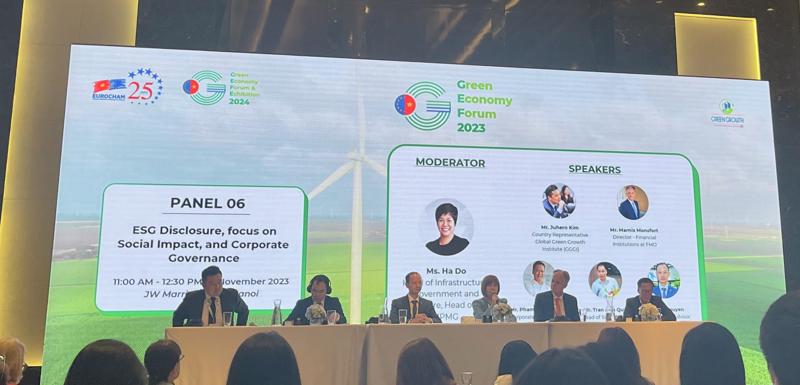Sustainable development associated with the implementation of environmental, social, governance (ESG) responsibilities is viewed as an inexorable trend and a focus within the development strategies of many fields, industries, and entire business communities in countries around the world.
ESG implementation plays an important role in conducting business and contributing to Vietnam’s commitment to reach net-zero emissions by 2050, experts told the “ESG Disclosure, Focus on Social Impact, and Corporate Governance” Panel at the “Green Economy Forum 2023” held on November 2 in Hanoi.
ESG is a relatively new concept for Vietnam’s business community, especially micro, small and medium-sized enterprises (MSMEs). However, since Vietnam made its strong commitment at the COP26 conference and with rapid shifts seen in the international market towards more sustainable and responsible business trends, ESG has almost become mainstream and increasingly receives widespread attention from businesses.
Indicators are an important factor revealing the entire picture of a business’s business activities, and integrated ESG reporting and the business’s business strategy can convey a message that it is taking the steps necessary for sustainable development and long-term profitability. “Everybody’s talking about ESG and that’s a very welcome movement,” said Mr. Juhern Kim, Country Representative of the Global Green Growth Institute (GGGI).
Reporting indicators on ESG and sustainable development are gradually becoming indispensable criteria for foreign investors when deciding on investments, because environmental and social standards are very important for all. “In order to choose an investment that develops closely with ESG, investors often consider the leadership aspect, the level of commitment of the team, and the means of implementation,” said Mr. Pham Nguyen Vinh, Business Development Director at Dragon Capital.
Similarly, Mr. Marnix Monsford, Director of Financial Institutions at FMO, said that beyond the State, State agencies, and businesses, GenZ is also very much aware of ESG, and this is expressed in the way they choose who to work for.
However, many companies in Vietnam face a significant gap when it comes to ESG reporting. Sixty per cent have an informal governance structure or no structure at all on ESG matters, and only 29 per cent have established well-defined ESG targets and metrics, while Vietnam’s overall figures are 51 per cent and 47 per cent, respectively.
Therefore, to implement ESG in an effective manner, experts advise that companies need to understand many factors, such as how to make decisions, how to measure risks, and how to build an ESG plan. Environmental issues also play an increasingly important role, from climate change to biodiversity and environmental pollution. Information distribution and raising awareness about the importance of ESG need to be enhanced through discussions, meetings, and the sharing of experience and knowledge.
At the same time, government agencies and regulators should develop clear policies to facilitate the ESG transition, along with detailed guidance on sustainability reporting practices.









 Google translate
Google translate